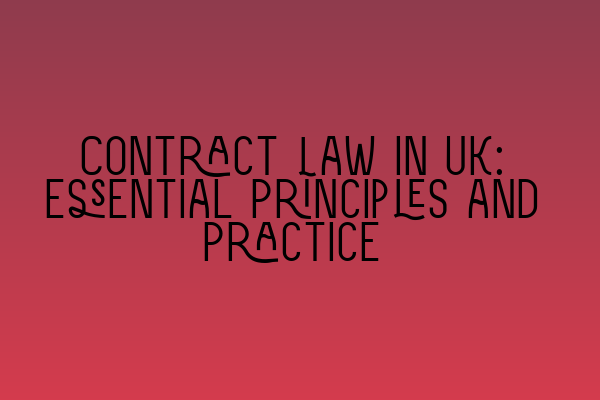Contract Law in the UK: Essential Principles and Practice
Welcome to the SQE Contract Law blog! As a solicitor, writer, and SEO expert, I’m excited to provide you with valuable insights into the essential principles and practices of contract law in the UK. Whether you’re a law student, legal professional, or someone interested in understanding the intricacies of contract law, this article aims to deliver comprehensive and engaging information.
Before we delve deeper into the topic, let me provide you with a brief definition of contract law. In simple terms, contract law governs the creation, interpretation, and enforcement of agreements between two or more parties. Such agreements, also known as contracts, are legally binding and are used to protect the rights and obligations of the involved parties.
Now, let’s explore the key principles and practices that underpin contract law in the UK:
1. Offer and Acceptance: Contracts begin with an offer from one party and an acceptance from another party. Here, it’s important to note that the acceptance must mirror the terms of the offer for a contract to be valid. If any changes are made to the terms, it becomes a counteroffer.
2. Consideration: Consideration refers to something of value exchanged between the parties. It can be in the form of money, goods, services, or even a promise not to do something. Without valid consideration, a contract may not be enforceable.
3. Intention to Create Legal Relations: For a contract to be binding, the parties must have a genuine intention to enter into a legally enforceable agreement. Certain agreements, such as social or domestic arrangements, may lack this intention, making them non-binding.
4. Capacity: Both parties must have the legal capacity to enter into a contract. This means they must be of sound mind, above the legal age limit, and not affected by any other legal incapacity that may restrict their ability to understand and fulfill their obligations.
5. Consent: Contracts require the free and genuine consent of the parties involved. If consent is obtained through misrepresentation, duress, undue influence, or mistake, the contract may be voidable.
6. Legality: Contracts must have a lawful purpose and must not be created to facilitate illegal activities. If a contract violates any statute or public policy, it will be considered void and unenforceable.
7. Terms and Conditions: Contracts should clearly outline the rights and obligations of the parties involved. The terms and conditions may be expressly stated or implied by law, custom, or previous dealings between the parties.
Understanding these principles is crucial when drafting, interpreting, or disputing contracts. Working through complex legal scenarios can be challenging, but with the right knowledge and expertise, you can effectively navigate the legal landscape.
To further enhance your understanding and expertise in contract law, I encourage you to explore the following related articles:
1. Navigating Legal Challenges and Pitfalls in Your Practice: Gain insights into the potential pitfalls and challenges that solicitors face in their daily practice and learn how to effectively overcome them.
2. Barrister vs. Solicitor: A Comprehensive Comparison: Discover the differences between barristers and solicitors, the roles they play in the legal system, and how they collaborate to serve their clients’ best interests.
3. Understanding the SRA Competence Statement: A Guide for Solicitors: Explore the Solicitors Regulation Authority’s (SRA) Competence Statement to understand the key skills and knowledge required for being a successful solicitor.
4. Exploring Different Solicitor Specializations: Finding Your Niche: Learn about the various specializations within the field of law and gain insights into finding and pursuing your niche as a solicitor.
5. Top Recommendations for Law Schools in the UK: If you’re considering a career in law, this article provides recommendations for some of the top law schools in the UK to help you make an informed decision.
As a solicitor, it’s essential to stay updated with the latest legal developments and continually enhance your knowledge and skills. By regularly exploring informative resources like the ones mentioned above, you’ll be able to expand your expertise in contract law and ensure the best outcomes for your clients.
In conclusion, contract law plays a vital role in regulating agreements and safeguarding the rights and obligations of parties in the UK. By understanding the essential principles and practices of contract law and staying informed about the legal landscape, you can navigate through complex contractual scenarios with confidence and achieve favorable outcomes.
Remember to consult with a qualified solicitor for personalized legal advice tailored to your specific situation. Stay tuned to the SQE Contract Law blog for future articles and insights that will further enhance your understanding of contract law and other legal topics.
Thank you for reading, and I hope this article has provided you with valuable insights into contract law in the UK!
